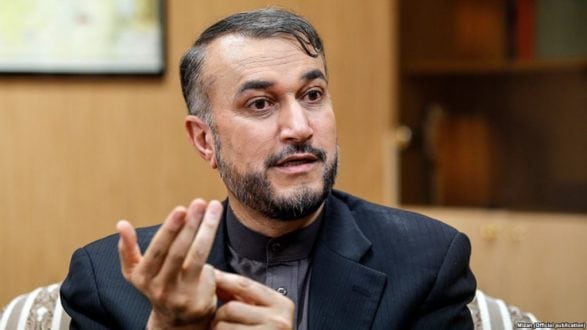radiofarda – Iranian Parliament Speaker’s special aide for foreign policy has claimed that there is a document indicating Saudi Arabia knew about the January 2016 attack on its embassy in Tehran a week ahead of the actual assault.
“A week before being attacked, Riyadh’s embassy had informed other diplomatic missions in Tehran that it was selling all of its vehicles”, Hossein Amir-Abdollahian, who previously served as deputy Foreign Minister for Arab and African Affairs, claimed.
Speaking to Tasnim, a news agency affiliated with the Islamic Revolution Guards Corps (IRGC), Amir-Abdollahian said that a copy of the document is currently kept at the Islamic Republic’s Foreign Ministry.
“It is also noteworthy that in that specific time, neither the Saudi embassy had been set on fire, nor anything had happened, nor had [Saudi Shi’ite fiery cleric] Ayatollah Nimr been executed,” Amir-Abdollahian reiterated.
Nimr Baqir al-Nimr, commonly referred to as Sheik Namr, was a prominent Shia cleric in Saudi Arabia who was among 47 people executed on 2 January 2016 for “terrorism offences”, despite the Islamic Republic’s protests.
A copy of Saudi Arabia’s embassy offering to sell all its diplomats’ vehicles was only sent to the diplomatic missions that have close ties with Riyadh, while the embassies friendly toward Tehran were kept in the dark, Amir-Abdollahian said.
Furthermore, the former deputy Foreign Minister disclosed that a copy of the Saudi document was handed over to Iran by one of the embassies that received the offer.
A day after Shiek Namr’s execution in Saudi Arabia, a crowd of angry protesters stormed into the Saudi embassy in Tehran and its consulate in city of Mashhad, ransacking offices and throwing Molotov cocktails at the building.
The incident forced Saudis to sever their diplomatic relation with Tehran.
If Saudis did send a letter to friendly embassies, it could have been sent because they knew the execution would take place and anticipated an angry reaction from Iran and prepared for a possible closure of their diplomatic mission.
During Last year’s presidential election in Iran, one of the candidates, current Vice President Eshaq Jahangiri, implicitly accused one of President Hassan Rouhani’s main challengers, IRGC commander Mohammad Baqir Qalibaf of being indirectly involved in the attack.
“Who was responsible for attacking the Saudi Arabian Embassy in Tehran and its consulate in Mashhad; the attack that consequently stopped the annual lucrative flow of 700,000 Saudi Shi’ite pilgrims to Iran?” Iranian VP raised the question during a fiery presidential debate in May 2017.
Jahangiri was referring to a mid-ranking cleric, Hassan Kord-Meehan, who led the attacks and at the time was a prominent figure in Qalibaf’s campaign headquarters.
Nevertheless, Amir-Abdollahian has insisted that “Those who threw Molotov cocktails at the Saudi Arabia’s Embassy in Tehran and set it on fire were not individuals affiliated with hardliners or IRGC’s Baseej militia. They were, indeed, foreign agents infiltrated into Iran who carried out their mission as they were directed.”
At the time, local news outlets reported that the security forces and police present at the scene did not step in to control the enraged attackers.
However, days after the attack, it was announced that forty suspects were detained during the assault.
Relations between Tehran and Riyadh have become strained in recent years after their conflicting views on regional developments, particularly on Yemen and Syria became more noticeable.
Relations further deteriorated after a deadly stampede in Mina, near Islam’s holy city of Mecca, on September 24, 2015, which killed well over 2,000 Hajj pilgrims, including 465 Iranians.
Tehran has blamed the deaths on the Al Saud’s mismanagement of the Hajj pilgrimage and criticized Riyadh for “lack of cooperation” on restoring the rights of families of the victims.
 Shabtabnews In this dark night, I have lost my way – Arise from a corner, oh you the star of guidance.
Shabtabnews In this dark night, I have lost my way – Arise from a corner, oh you the star of guidance.



